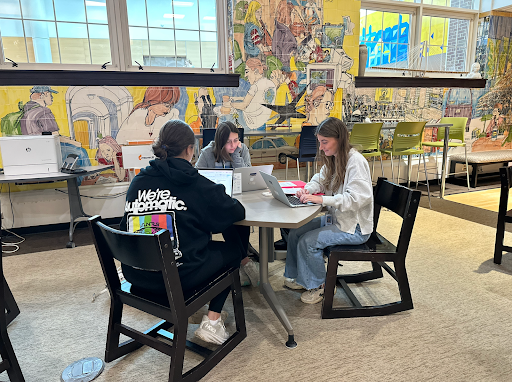My older brother, Colin Jasper, attended Butler University his freshman year after graduating from Lake Forest High School in 2021. His sophomore year, he decided not to re-enroll; instead, he chose to live at home while working full time as a salesperson at Ogden Foods.
When people ask the common question, “Where does your brother go to college?” and I tell them he’s been living at home and working a stable job for the past two years, their reactions aren’t always positive. It takes a lot of strength for me to not get defensive. It’s really disappointing to hear disparaging remarks and it makes me think about how hurtful it would be if someone said these things directly to my brother.

I used to feel the need to justify his decision to them, but now I realize I don’t need to defend him because his choice was completely valid. I had always thought that college was essential for success but after watching Colin thrive, I saw that I was wrong. I just hadn’t realized that there were other paths to consider after high school because schools often don’t inform students about alternative options.
The stigma surrounding kids who finish high school and don’t immediately go to, or graduate, from college is a significant issue. This stigma stems from societal expectations and misjudgements.
Growing up, many children are told that the primary path to success and a stable life is by receiving a college education. This can lead to the misconception that those who don’t attend or graduate from college are less ambitious or capable.
The majority of LFHS students have faced both internal and external pressures regarding college. College meetings at LFHS start as early as sophomore year. Even in the early stages of high school, we’re told that we have to start thinking about our futures with college being presented as the ideal path.
During junior year, school counselors help us prepare for ACT or SAT testing, encourage us to explore potential colleges and set up meetings with our parents to discuss all of these topics. From there, the anxiety starts to build up. Parents, teachers, family, and friends begin asking, “Do you know where you want to go to college and what you want to major in?”
As a society, we need to stop assuming that all students plan to go to college immediately after graduating from high school as there are many factors that contribute to deciding if pursuing a college education is the right choice. Pursuing entrepreneurial ambitions, desiring travel experience, practicing skill-based careers and, most importantly, considering financial factors are all pressing concerns when choosing your unique path.
Many people believe that nearly all careers require a college degree. However, this is not the case. According to the Burning Glass Institute and the Strada Education Foundation’s Institute for the Future of Work, more than half of college graduates (52%) are “underemployed” one year after graduating, meaning they’re working a job that doesn’t “significantly utilize”or require their diploma. Fast forward ten years and studies show that 45% of college graduates remain underemployed.
These findings support the claim that a college degree isn’t always a guarantee of labor market success. There are various career paths that lead to achieving success in life that don’t require a college education such as entrepreneurship, skilled trades, sales jobs, healthcare services, technology-based jobs, and so many more.
My brother, Colin, had many personal reasons and goals that drove him to take a chance and choose not to re-enroll his sophomore year. At an early age, he knew that school was never a passion of his; he didn’t feel that he thrived in academic environments. However, everybody still talked about how necessary it was to get “the college experience.”
“I found out that the college experience is what you make of it and that it’s different for everybody. My first year of college was okay, but ultimately it helped me see things through a different lens. I questioned if going through four more years of school would actually teach me something to carry into the business world,” Colin said.
Initially, Colin thought he would take a gap year after his freshman year to find a career path that interested him because, like many college students, he was unsure of what direction to go in. A family friend suggested he work for him for a year to see how it would go.

“The job offer was in sales and I had zero clue what I was doing. It took some time but I eventually found my footing and I’m really happy now. I like dealing with real problems within a business– tough situations that you have to make a gut call on, and you might be right or completely wrong. But I’ve realized that learning from your mistakes is what builds experience,” Colin said.
Colin initially moved to Lake Forest his sophomore year of high school, entering a town that values the “typical” route of completing four years of college after high school. He shares the community’s response to his decision regarding his education.
“Lake Forest is a great town to raise a family and to grow up in. There is a strong mindset here, though, that if you don’t go to college you will not be successful. I have had mixed reactions from people regarding my choice to come back– some totally disagreeing with my choice, suggesting that I go back to school, and some telling me how brave I am for taking a chance. Everybody is entitled to their opinion but I happen to believe you can be successful taking a different track,” said Colin.
Colin highlights his personal development after working in a consistent sales job.
“Change is hard, but change is what builds you to be better. I’ve been with my company for almost two years now and I wouldn’t want to be doing anything else. Being in sales has taught me to stay patient and how to read people. It takes a lot of hard work and patience but, when it clicks, it’s the greatest feeling in the world. That’s what keeps you coming back,” Colin said.
That being said, if you do choose to attend college, it doesn’t have to be the place that you stay. The preconception many people have that once you commit somewhere, it must be the place you have to stay, causes unnecessary pressure on the decision making process.
Alex Pasinato graduated from LFHS in 2021. He briefly attended Michigan State University but, after coming to an understanding that a “normal” or “typical” college life consisting of four years was not right for him, he decided to return home.
“My mental health and well-being was all over the place. What motivated me to pursue a different path was a desire to take myself out of a bad situation that was helping no one, especially not me. I quickly understood that I needed to have a reset and figure out what I needed to do to be successful,” Pasinato said.

Pasinato went on to join the United States Army where he drove gun trucks and operated weapons on vehicles.
“When I got home from MSU, I was not who I wanted to be, so I joined the Army– something I had dreamt of and wanted to do even before high school. The Army really helped and shaped me into the person I am today,” Pasinato said.
After seven months of training, Pasinato returned home to Lake Forest and attended the College of Lake County in Grayslake. Additionally, he achieved his dream job as a CSO at Lake Forest police department. Since then, he continues to live his life while managing the Army, school, and work.
“I receive many negative reactions from people about what I decided to do. However, I typically ignore their comments and keep working because those people are closed-minded and truly don’t care or even try to understand,” Pasinato said.
Pasinato offers advice to others who are considering pursuing a different path.
“My advice to others that think college may not be for them, and feel that any sort of different approach than the “traditional” path is limited to only working, is to make a decision and go with it. The only thing that matters is you, how you’re doing, and what you can do to better yourself with whatever profession you choose,” said Pasinato. “However, I would say to give college a shot. Don’t just base an opinion on loose facts and bad data from others attempting college, whether it’s CLC or a university. I gave it a shot and now I can confidently tell myself I know it’s not for me.”
For Pasinato, working for the Lake Forest Police department has been a dream come true.

“I get to drive three minutes and work in the town I grew up in– and still live in. It’s a sense of pride that not a lot of people will understand. I’ve never had a negative thought about going to work because I genuinely like my job. I know I have grown positively since I started working for LFPD over two years ago,” Pasinato said.
He emphasizes how working as an LF police officer has impacted his personal and professional growth.
“Working the job has helped shape me into the person I am now and has improved my mental health because doing what I’ve done is hard, especially coming from this town. Handling pressure and being comfortable while also being uncomfortable is something I’m well adjusted to now,” Pasinato said.
Pasinato serves as a prime example that exploring various paths to discover what truly resonates with your passions and strengths can help you find what makes you thrive and lead to personal development.

Meanwhile, some LFHS alumni, like 2024 graduate Ainsley Mitchell, chose to take a gap year. Many people assume that a gap year indicates a lack of direction or ambition, or they assume that the time off might be wasted if not spent “productively.” However, these misconceptions often overlook the multitude of benefits associated with a gap year: attaining valuable life experiences, learning new skills, and gaining clarity of future life goals.
Mitchell explained that taking a gap year was always her plan straight after high school because she wanted to be able to see the world and experience a different style of living before furthering her education. Having previously lived in Australia, Mitchell shared that taking a gap year seemed normal to her as that’s what most people do in her home country. She explained the societal and cultural differences between America and other countries in regards to education.
“America is very set in the expectations for education with students expected to attend elementary school, middle school, high school and college, and then immediately get a job without a break. So, I’ve definitely received some negative reactions when telling other parents about my plans to take a pause for a year. I try to ignore the negative commentary and just thank them for their good luck wishes,” Mitchell said.

She highlights how her gap year has enlightened and matured her in ways that she doesn’t think a freshman year at college would have.
“As soon as school was over, I worked every day until I left for my travels, saving 100% of my earnings for my trip. I now have to make sure I have a place to stay, food I’m able to get, transportation to get around, and planned activities to see incredible sights. Doing all of this while living out of a backpack has taught me how to budget money, as well as understand the value of money in a global sense,” said Mitchell.
It’s essential to explore different options and find a path that aligns best with your interests and aspirations as one’s mental and physical well-being is more important than merely chasing society’s definition of success.
Colin, Alex, and Ainsley show that people can achieve success– without immediately going to college– by working in a career and doing things every day to help the world and find their passions.
For me, pursuing a college education is something that I want to do. This does not mean that my choice is the only right one; it’s simply the right decision for me. I think that the key is to find what makes you happy and fulfilled; if you can do that, isn’t that a form of success in itself?
It’s important to respect and recognize that there are many different educational and career paths; success in life is not a one-size-fits-all. Ultimately, it’s up to you to determine how you define success for yourself, and it’s necessary to realize that other people’s perceptions may differ from yours. All in all, there is no single “right” path to follow after high school.
“My biggest advice to people that are contemplating taking another path would be this: take the chance and don’t be afraid,” said Colin. “The world can be a scary place but with the right mindset, you can accomplish anything. You can always go back to school, so I think it’s important to take advantage of other opportunities around you.”








